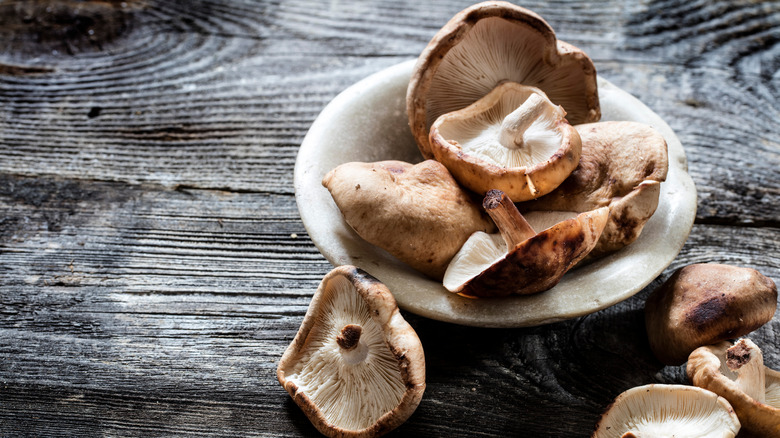Are Shiitake Mushrooms Good For You?
When you think of popular foods from East Asia, you might imagine sushi or kung pao chicken — not a mushroom. However, shiitake mushrooms, which are native to Japan and China, are the second-most consumed type of mushroom worldwide, according to a 2022 market research report by The Brainy Insights. These edible fungi are loved for their umami flavor, which the experts of The Mushroom Council describe as savory, woodsy, and smoky.
There are practically endless ways to enjoy shiitake mushrooms. They can be roasted, pickled, eaten raw, or used as a topping to finish off a dish. The mushroom can also be added to soups, mixed into pasta sauces, stuffed into dumplings, or fired up in a stir-fry (per Masterclass). Additionally, shiitake's firm, chewy texture can make it an ideal contender for a meat replacement in vegetarian dishes.
Besides being delicious and versatile, shiitake mushrooms are also packed with nutrients and health-boosting properties.
Shiitake mushrooms offer a boost to physical health
Shiitake mushrooms are low in calories but high in essential nutrients. A serving of four mushrooms contains only around 44 calories but offers substantial amounts of certain vitamins and minerals, according to the U.S. Department of Agriculture. For example, one serving contains 39% of the daily recommended value of copper, 33% of vitamin B5, and 11% of both riboflavin and niacin (per Healthline).
Luckily, certain compounds in these mushrooms also reduce cholesterol and inflammation, bolstering heart health (via WebMD). In addition, the polysaccharides found in shiitake are known to boost immunity and prevent cell damage. Another major health benefit is the potential protection against cancer. One 2021 study published in Frontiers in Oncology concluded that a polysaccharide in shiitake mushrooms is effective in slowing the growth of certain types of cancer. However, more research may be needed to understand the use of the mushroom in cancer treatments.
Generally, shiitake mushrooms are a healthy addition to most diets, however, some may want to steer clear of this fungi due to side effects. A 2015 study published in the journal Anais Brasileiros de Dermatologia discussed a condition called shiitake dermatitis, where the mushroom causes a skin rash. If you experience skin symptoms after eating shiitake mushrooms, you may want to abstain from eating them to avoid side effects. The experts at WebMD also warn against consuming shiitake if you have an autoimmune disease or experience hypereosinophilic syndrome, which is a blood disorder.


